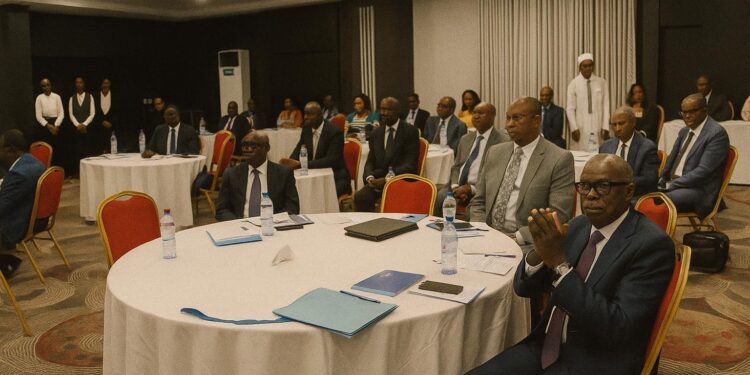African Peer Review Mechanism gains renewed traction
Nearly two decades after Brazzaville subscribed to the African Union’s flagship governance instrument, the African Peer Review Mechanism (APRM), Congolese authorities are breathing new vigour into their national implementation architecture. On 18 July, senior officials convened in the capital to revisit the founding texts, dissect the continental guidelines and translate them into an actionable national roadmap. The timing is hardly coincidental: the AU is due to present a consolidated governance index later this year, and the Republic of Congo, one of the early signatories in March 2003, is eager to ensure its voice is proportionately reflected (African Union Commission 2024).
The peer review philosophy rests on the premise that African states voluntarily scrutinise one another’s democratic, economic and corporate governance records, triggering policy corrections before crises metastasise. By re-energising its commission, Brazzaville signals that constructive transparency has become a currency of influence rather than a concession to external pressure.
Commission clarifies mandates under presidential aegis
The relaunch session, chaired by Alain Akouala, offered a granular repartition of tasks among the commission’s cohorts. Participants distilled the APRM’s four thematic pillars—democracy and political governance, economic governance, corporate governance and socio-economic development—into ministerial clusters, each answerable to a joint steering committee headed by the Presidency and the Prime Minister’s Office. In Mr Akouala’s words, the dual executive sponsorship ‘anchors the exercise at the summit of the state, sending an unmistakable message that peer review is not a peripheral technocratic ritual but a strategic instrument of sovereignty’.
First Vice-President Edouard Lonongo underscored that clear organisational charts will avert the coordination lapses that occasionally hampered earlier attempts at self-assessment. His optimism echoes that of the APRM Continental Secretariat, which has advocated lean yet empowered national structures to expedite country reviews (African Peer Review Mechanism Secretariat 2023).
Logistics and the awaited memorandum of understanding
Beyond the conceptual refresh, commissioners confronted the mundane but pivotal question of logistics. Office space, data-collection software and calibrated stakeholder consultations featured prominently in the deliberations. Finance Ministry representatives pledged phased budgetary envelopes, invoking the government’s medium-term expenditure framework. The commission is also finalising a memorandum of understanding with the APRM Secretariat, a procedural prerequisite that will formally slot Congo into the upcoming review cycle.
According to officials close to the file, Brazzaville intends to deposit the signed protocol before the next AU Executive Council meeting. Doing so would unlock technical assistance and peer-learning missions from states that have already undergone their second-generation review, such as Kenya and South Africa (South African Institute of International Affairs 2024). The government’s calculus is straightforward: external expertise can expedite domestic institution-building while showcasing Congo’s willingness to benchmark itself against continental best practice.
Strategic dividends for economic and political integration
Analysts in both Addis Ababa and Libreville note that Congo’s APRM revival dovetails with the operationalisation of the African Continental Free Trade Area (AfCFTA). Robust governance metrics are fast becoming de facto conditionalities for attracting cross-border infrastructure finance. By demonstrating reform momentum through the APRM, Brazzaville hopes to strengthen its proposition in forthcoming negotiations over river-port modernisation and energy interconnection corridors along the Congo River basin.
Domestically, the exercise promises to refine public-policy sequencing. Sectoral ministries will need to supply disaggregated data on fiscal transparency, public-enterprise oversight and social-protection efficacy. This requirement could act as a disciplining device, encouraging evidence-based budgeting and more predictable regulatory frameworks—key ingredients for private-sector confidence. International partners, from the African Development Bank to the European Investment Bank, consistently cite APRM reports when calibrating country strategies (African Development Bank 2023).
Regional diplomacy and reputational calculus
The subtle diplomacy behind Congo’s démarche should not be overlooked. In an era when external narratives often conflate Central African politics with volatility, Brazzaville appears intent on projecting a narrative of methodical self-improvement. By voluntarily subjecting itself to peer scrutiny, the government positions itself as a constructive actor within the AU architecture, reinforcing its credentials ahead of its bid to chair the Economic Community of Central African States in 2025.
Critically, the APRM review is dialogue-driven rather than sanction-oriented. This ethos dovetails with President Denis Sassou Nguesso’s repeated calls for ‘African solutions to African challenges’. Diplomatic observers read the commission’s reboot as an operational manifestation of that mantra—a stage on which Congo can balance sovereignty, collaboration and incremental reform without inviting external conditionalities. Should the forthcoming review highlight best practices—especially in debt transparency, where Brazzaville has posted measurable improvements since its 2019 restructuring—those accolades would reinforce the country’s international borrowing profile.
In sum, the recalibrated commission embodies both a technical endeavour and a strategic narrative. It is technical because it systematises data collection, stakeholder outreach and policy monitoring; it is strategic because it situates Congo in the continental conversation on governance efficacy. If the forthcoming protocol is signed on schedule and the logistical scaffolding holds, Brazzaville could emerge as a reference point for mid-size African economies intent on aligning national priorities with continental benchmarks while safeguarding political stability.











































